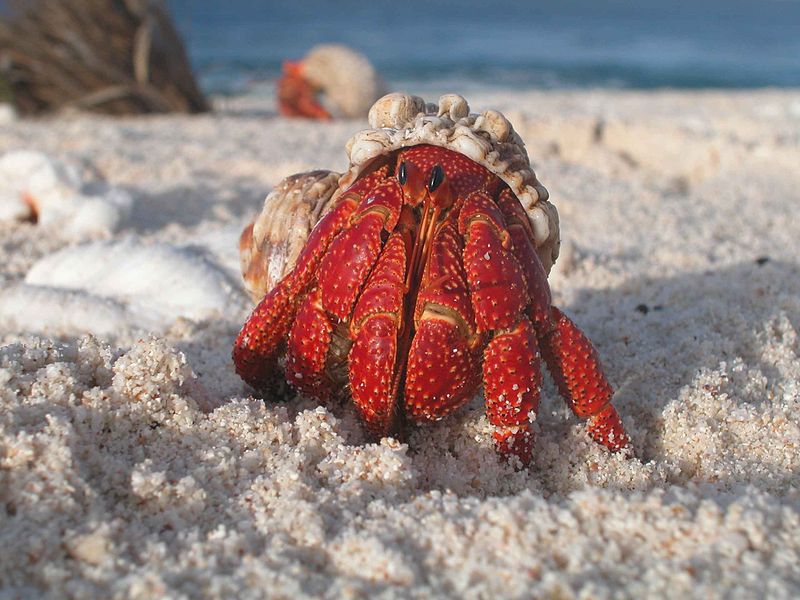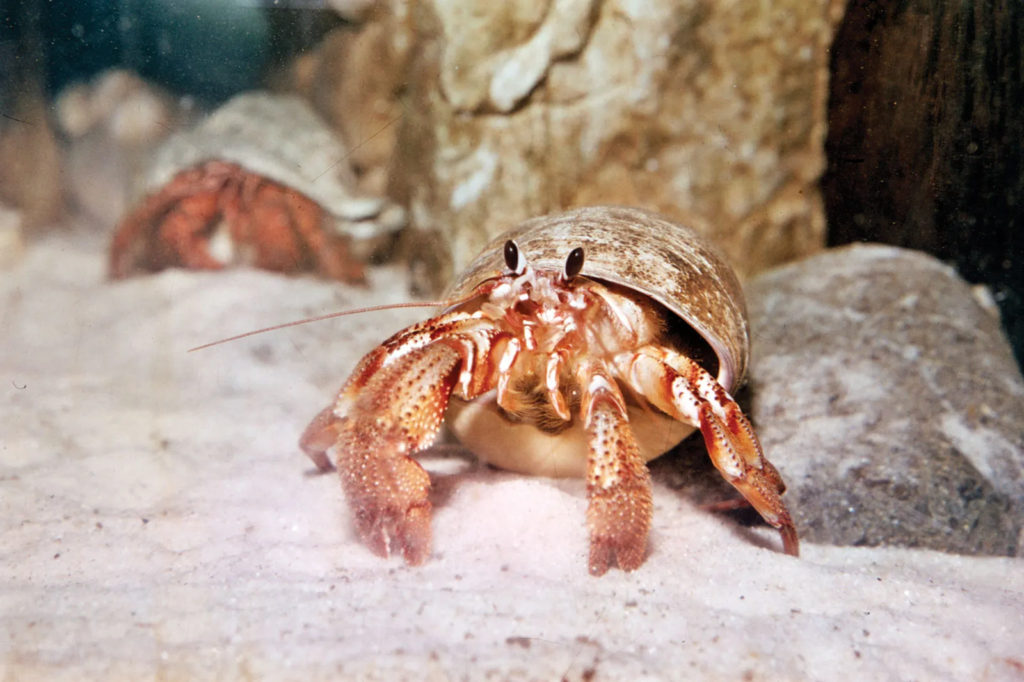Table of Contents
ToggleIntroduction
Hermit crabs, those small, intriguing crustaceans that often make their homes inside empty shells, have captivated nature enthusiasts and pet owners’ curiosity. Do Hermit Crabs Smell? Keeping hermit crabs as pets can be a delightful experience, but it’s essential to understand various aspects of their care, including odor.
Hermit Crab Biology And Behavior
Natural Habitat: Hermit crabs are common in tropical and subtropical regions, primarily near the ocean. They require access to both land and water, as they are amphibious creatures.
Shell Dwelling: Hermit crabs are unique in using empty seashells as mobile homes. As they grow, they must find larger shells to accommodate their increasing size. This behavior is essential to their survival and is an interesting aspect of their biology.
Factors Contributing To Odor
Decomposing Organic Material: Hermit crabs are scavengers and will consume a variety of organic matter, including dead plants, leaves, and even deceased animals. As they eat, organic material can accumulate in their enclosure, leading to unpleasant odors as it decomposes.
Inadequate Cleaning: Neglecting regular cleaning of the habitat, including the substrate (the material covering the enclosure floor), food dishes, and shells, can result in a buildup of waste and uneaten food, which can emit odors.
Humidity Levels: Hermit crabs require a specific humidity level to maintain healthy respiratory function. If humidity levels drop too low, it can cause problems such as respiratory distress, which can sometimes lead to a noticeable odor.
Water Quality: Dirty or stagnant water in the freshwater pool of the hermit crab enclosure can become a breeding ground for bacteria, producing foul odors.
Molting Process: Hermit crabs shed their exoskeletons periodically as they grow. A distinct odor may be associated with the shedding during molting, which can be stressful for the crab.
Managing Hermit Crab Odor
Regular Cleaning: Ensure you clean the enclosure at least once a week. Remove any uneaten food, clean the substrate, and sanitize the water dish.
Provide Proper Humidity: Invest in a hygrometer to monitor humidity levels in the enclosure. Keeping the humidity between 70% and 80% will help prevent respiratory issues and minimize odors.
Use Clean Substrate: Opt for natural substrate materials like coconut coir or sand. These materials help maintain humidity and reduce odor by allowing waste to be it.
Monitor Diet: Be mindful of your hermit crabs’ diet and ensure you provide them with a balanced and appropriate selection of foods. Remove any uneaten or spoiled food promptly.
Shells and Molting: Always have a variety of appropriately sized shots available for your hermit crabs. A comfortable cover will reduce stress and odors during molting.
Ventilation: Ensure proper ventilation in the enclosure to prevent stagnant air, which can exacerbate odors.
Factors Contributing To Odor
Decomposing Organic Material
Hermit crabs are natural scavengers, which means they consume a wide range of organic matter, including dead plants, leaves, and sometimes even deceased animals. As they eat, organic material can accumulate in their enclosure. Over time, this accumulated waste can decompose, emitting unpleasant odors. Regularly removing uneaten food and cleaning the substrate can help mitigate this issue.
Humidity Levels
Hermit crabs require specific humidity levels to thrive. If the humidity in their enclosure drops too low, it can result in respiratory issues. Additionally, low humidity can contribute to a stale or musty odor. Monitoring and maintaining humidity levels between 70% and 80% is essential for the crabs’ health and odor control.
Water Quality
Stagnant or dirty water in the freshwater pool of the hermit crab enclosure can become a breeding ground for bacteria. Bacterial growth can produce unpleasant odors that permeate the habitat. Regularly cleaning and replacing the water in the pool is essential to prevent this issue.
Managing Hermit Crab Odor
Substrate: Remove and replace a portion of the substrate regularly, usually every week. It prevents the buildup of waste and helps keep the habitat fresh.
Food Dishes: Remove uneaten food promptly to prevent it from rotting and emitting foul odors.
Shells: Occasionally, clean and inspect the covers to ensure they are free from contaminants like algae, which can contribute to odor.
Water Dish: Regularly clean and sanitize the dish to prevent bacterial growth. Replace the water to keep it fresh.
Providing Proper Humidity
- The humidity in the habitat should be measured with a hygrometer. Keep the humidity between 70% and 80% to prevent respiratory issues and minimize odors.
- Maintain a moist substrate by lightly misting it with dechlorinated water as needed.
- Provide a designated area with a wet sponge or moss as a humidity source within the enclosure.
Using Clean Substrate
- The substrate material choice is essential for humidity control and odor management. Consider using natural substrate materials such as coconut coir or sand:
- These materials allow waste to be buried, reducing the likelihood of odors emanating from the surface.
- Avoid substrates that may become moldy or sour when wet, as they can exacerbate odor problems.
Additional Tips

Isolating Molting Crabs
During molting, hermit crabs are vulnerable and may emit a distinct odor. To minimize stress and potential odor exposure to other crabs:
- Consider isolating molting crabs in a separate enclosure, an isolation, or a molting tank.
- Provide a quiet and disturbance-free environment for molting crabs to help them complete the process successfully.
Avoiding Overcrowding
- Hermit crabs require space to move around, establish territories, and prevent overcrowding-induced stress. Overcrowding can increase waste accumulation and resource competition, resulting in heightened odors.
- Ensure that you provide an adequately sized enclosure for your hermit crabs, considering their numbers and sizes.
Cleaning Shells
- Periodically inspect and clean the shells in your hermit crab habitat. Remove contaminants, like algae or residue, which can contribute to odors.
- Ensure a variety of appropriately sized shells is available for your hermit crabs to prevent stress and odor issues during shell changes.
Odor Control Products
Some hermit crab owners use natural odor-absorbing materials or products to help reduce smells in the enclosure:
- Place sphagnum moss or activated charcoal strategically in the habitat to absorb odors.
- However, please exercise caution when introducing any products to the enclosure, ensuring they are safe for your hermit crabs and won’t harm their health.
Conclusion
Hermit crabs can emit odors, but these smells are manageable with proper care and maintenance. By understanding the factors that contribute to aroma and following the guidelines for maintaining a clean and healthy habitat, you can enjoy the companionship of these unique creatures without being overwhelmed by unpleasant smells. Remember that hermit crabs, like any pets, require attention and care to thrive and give you a fascinating glimpse into the natural world.







